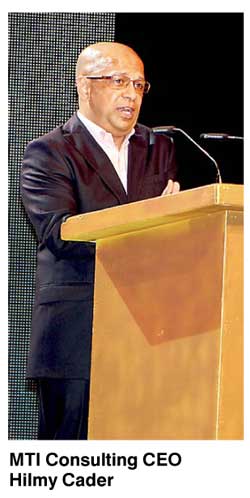Monday Feb 16, 2026
Monday Feb 16, 2026
Tuesday, 29 September 2015 00:02 - - {{hitsCtrl.values.hits}}
Delivering the keynote speech at the CIM Future Marketer’s Conference, MTI Consulting CEO Hilmy Cader inaugurated the session with two hard-hitting questions of whether there are sufficient marketers as CEOs and if marketing is the most respected function.
After the ‘target audience’ agreed that neither one of the questions can be answered satisfactorily, he continued to discourse the importance of ‘value creation’ by the marketers, since the profession is misunderstood and the scope is not appreciated. His presentation was themed ‘Forget Marketing – Focus on Cross-Functional Value Creation’.
Drawing from his consulting experience, he emphasised on how marketing in many scenarios had failed to produce or effectively convey the business value creation made by marketing and that marketing was largely high on ‘silo impact.’ This established the game plan for the session which was to drive the thinking, in order to achieve career progression and respect for the future  marketers.
marketers.
He also highlighted the pressure on future marketers to break away from functional specialisation, to value creation and thus need to forget about the term marketing in order to adapt to changing business requirements.
Firstly he pointed out how capital has become increasingly impatient with regards to returns on investment on marketing activity. It has become very essential to prove and balance short term and long term impacts of marketing activity. The obligation to deliver quick short term results as a marketer has increased largely over the last few years.
Furthermore, it is important to drive marketing accountability by effectively measuring and evaluating marketing impact. While the general notion may be that measuring marketing impact is difficult due to its intangible nature, it is up to the business to devise effective criteria to evaluate such activity. Every marketing activity should have an ROI and there has to be a strong fundamental appreciation of financials among marketers.
As marketers, it is also important to rationalize everything from products, brands, customers, channels and marcoms and ask the hard questions. How does each and every item impact the bottom line? If they do not add value, then why do it at all? Hilmy exemplified this notion by using an example of how a prevalent MNC rationalised their brand portfolio, which ultimately increased the margins for the entire organisation.
There is also an increasing need for marketers to attain a deeper appreciation of behavioral sciences such as psychology, sociology and demography. Understanding complex human behavior has become a vital necessity among marketers and using these to develop behavioral and scientific models to complement marketing activity is very important and will help businesses to gain significant competitive advantages.
Elaborating on how Tesco and popular disruptive models such as Airbnb have redefined supply chains, Hilmy also pointed out how marketers need to understand the importance of the supply chain. Mentioning that it is as important as the demand chain, he went on to explain how channel power has also evolved with more collaboration activity taking precedence over dominance.
Talking on value chain specialisation, he addressed how ‘silo mentality’ is being overpowered by increasing cross functional value creation which is also applicable to conventional financial systems. Hence, it is becoming important for marketers to think and learn business processes in cross functions.
Furthermore, Hilmy touched upon marketers need to drive sustainable initiatives and to address mass socio-economic challenges within the lower level of the pyramid, which is mainly an untapped business opportunity. Finally he concluded by appealing to marketers to always ask the hard questions, keep things extremely simple and to ‘be thought masters before toast masters!’